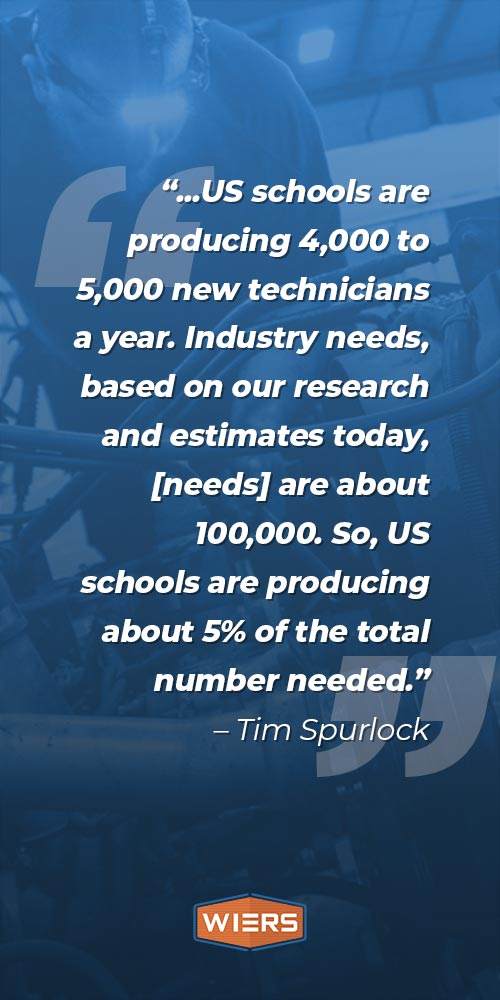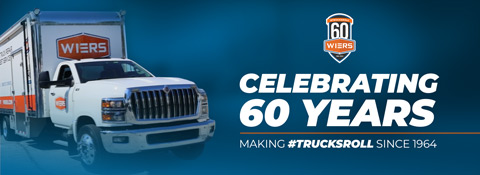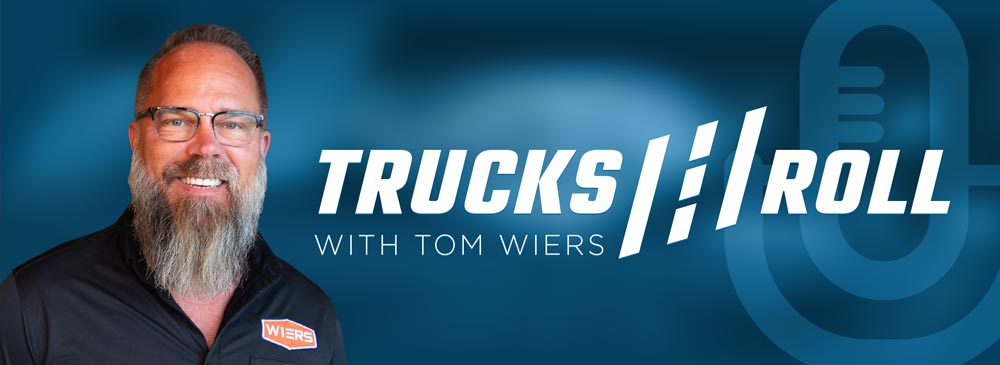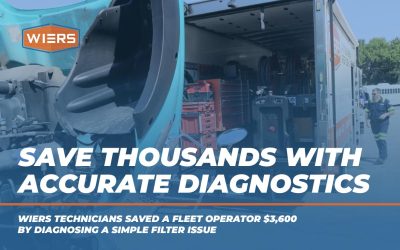
Solving the Diesel Technician Crisis – Trucks Roll Podcast Ep. 4
Part 1: The Current Challenges of Hiring Diesel Mechanics
In part one of our int
erview with Tim Spurlock of American Diesel Training Centers, we discuss the current lack of qualified diesel technicians. There are currently tens of thousands of open positions for diesel mechanics in America, but a lack of qualified candidates to fill them. How big is the issue, and what is Tim’s approach to solving this problem? Check out part 1 to learn more!
We at Wiers are experts in this field and can help you keep your vehicles on the road and earning. Visit us at wiers.com today to learn more about our services and fleet partnership plans today!
What You’ll Learn:
- There are thousands of openings for techs across the country.
- Education opportunities for training mechanics can be difficult.
- American Diesel Training Centers has developed an accessible pathway to training.
Here is the transcript for Trucks Roll Ep. 4:
Tim Spurlock: I’m talking US schools are producing 4,000 to 5,000 new technicians a year, industry needs based on our research and estimates today about 100,000. So, US schools are producing about 5% of the total number needed.
Tom Wiers: Hi everyone, this is Tom Wiers with the Trucks Roll podcast. Today, I’m bringing Tim Spurlock to you from American Diesel Training Centers in Columbus, Ohio. I met Tim several years ago and he and his partner started a very unique and innovative way to train diesel technicians. So, we’re going to break this podcast up into a couple different sections.
The first section we’re really going to focus on and discuss the overall tech shortage problem, not only in the United States but around the globe. So, I hope you enjoyed this this first session with Tim and here it is, enjoy the podcast.

Hi, welcome to the Trucks Roll podcast. I’m Tom Wiers, I’m excited to bring some great content with you today. We’ve got Tim Spurlock with American Diesel Training Centers. He’s going to share some of his business model and experience with a big problem within the industry, which is diesel technicians, finding them, growing them, and helping the industry out because there’s definitely a shortage. So Tim, welcome to the Trucks Roll podcast. It’s a pleasure to have you onboard. Why don’t you make a little introduction of yourself if you don’t mind?
Tim Spurlock: Yeah, thanks Tom. Great to be with you. Yeah, so my name’s Tim Spurlock. I always start out my introductions in that I don’t have a ton of experience in terms of working on trucks, physical vehicles, but what I do have is 25 years plus experience in higher education and specifically skilled trades training. So, that’s really where I cut my teeth, then developed a model for American Diesel Training Centers. We founded the business in 2017 and we’ve had quite a ride, especially over the last two years.
Tom Wiers: So Tim, tell me, when did you discover this shortage of technicians and think about coming up with a solution on your own? I’d love to hear that journey and about American Diesel Training Centers.
Tim Spurlock: Yeah, that’s a great question. It’s actually a global journey. So, I ran sales for what I would call a boutique, global company that produced curriculum for schools that produce automotive and truck mechanics. So, think textbooks software, we had clients all around the world, but they were mostly schools, mostly schools, probably 95% schools. We started getting calls and emails from companies, service managers saying, “Hey, we’d like to buy your product to train our employees.” The first thing we said was we don’t really think it’s appropriate. I mean, end to end, it was probably 40 hours of video, 3000 pages of textbooks. “We don’t really think it’s appropriate.” And they would, they would always say, “We don’t care. We’re hiring people off the streets. And so I got really interested in that.”
Then fast forward a little bit, same company and I was just kind of testing the market like, should we create a product that we pointed towards industry? So, we were meeting with a trucking company here in Columbus, Ohio, and the exact same thing. We were meeting with the owner and he was like, “The training’s okay,” but he goes, “I can’t find anybody.” He said, “I had a kid show up. He had very little training. He had this little tiny hand tool set. He’d said he’d done an automotive program in high school and I asked him, I said, ‘Will you show up on time and come to work every day?’ And the kids said yes.” So he said, “I hired him.”
I was like, there’s really an interesting and meaningful problem that we could potentially solve here. Then again, we were a global company, so we did a lot of work around the world. So, I’m sitting at in Cape town, South Africa in the launch of a new apprentice training facility. Their system’s different down there. But anyways, the CEO of the largest importer of vehicles in Africa, Imperial Motors, stood up in front of everyone and talked about the shortage of skilled artisans in South Africa. I’m like, “You literally can’t get farther apart in the world than the United States and South Africa.”
Tom Wiers: That’s interesting.
Tim Spurlock: And they both have the exact same problem. So, that’s where it all started, yeah. So, I put together a plan for my company that time to produce products for this market, got shot down. I said, “I think I’m just going to go do on my own.”
Tom Wiers: That’s fantastic. So, this is a global promise, not just a United States or Indiana, Ohio problem is what I’m hearing you say?
Tim Spurlock: Huge. Yeah, it’s a huge global problem. It literally doesn’t matter what corner of the globe you go to, Africa, Brazil, South America, the UK, everywhere, Australia. It’s a global problem.
Tom Wiers: So, we in the industry, we use the technician shortage. I mean, I think it’s thrown around a lot, but is it really technician shortage, or is it growing demand? I mean, is the shortage because there’s not enough coming into the workforce? Is the shortage because the demand is growing faster than the supply? Or can you tell us a little bit about as you guys have studied this problem, what’s going on out in the marketplace with diesel technicians? I don’t know, I say diesel technicians, maybe it’s all technicians, but I guess we’re most interested in diesel perspective.
Tim Spurlock: You’re completely right, Tom. So, you can swap out diesel technicians for skilled trades. So, automotive techs, diesel techs, HVAC, power gen, heavy equipment, off highway, all that.
Tom Wiers: Okay, great.
Tim Spurlock: Just swap all out. They’re all interchangeable. But yeah, so you’re exactly right. I’ve read so many articles about this and done so much research on it and the term gets thrown around a lot. I think that if I had one piece of advice that I really want people to get their heads around is that the system is broken, it is failed. When I say system, I mean the US educational system, which companies have relied on for their talent, has broken. I don’t know that it’s anyone’s fault, but we can tell antidotes all the time, kids don’t grow up today working on cars.
I have two boys and one’s 21, 22, the other one’s 20. None of their friends work on cars. So, I don’t think there’s as much interest from young people to work on cars, it’s really typically only parts these days. But the biggest problem is it’s an input problem.
There are roughly 225, depending on where you look, schools that produce diesel technicians. For example, Columbus, Ohio, where I live, there’s not one high school diesel program in the entire city, not one and it’s the 13th largest city in the United States. So, most of these programs are post-secondary. So, the problem really boils down to, there are not enough people entering at the front end of the pipeline and there’re definitely not enough people leaving at the back end of the pipeline for industry to be able to hire and then bring in.
I’m talking US schools are producing 4,000 to 5,000 new technicians a year, industry needs based on our research and estimates today about 100,000. So, US schools are producing about-
Tom Wiers: Wow.
Tim Spurlock: … 5% of the total number needed. This information’s relatively available. You can find it on US Department of Education websites, US government websites, all that kind of stuff. So basically, nobody today is saying, “Hey, I think I want to work on trucks. I’m going to find a local community college or a trade school to go to learn this craft.” That’s the problem. It’s an input problem and then there’s a huge demand problem on the other side.
Tom Wiers: So Tim, you said the need annually is 100,000 new, and there’s 4,000 to 5,000 being generated. Is that what I heard you say? And that’s on the diesel side?
Tim Spurlock: Mm-hmm (affirmative), mm-hmm (affirmative).
Tom Wiers: That’s just diesel?
Tim Spurlock: Just on the truck side, who only take truck, yeah. That doesn’t include off highway and power gens.
Tom Wiers: That’s scary.
Tim Spurlock: Just trucks.
Tom Wiers: So Tim, tell me how many technicians are there in the United States right now, diesel technicians? If we need 100,000 and we’re only producing 4,000 or 5,000, what’s the total population?
Tim Spurlock: There’s decent data on this. The US Department of Labor says there are roughly about 250,000 working diesel mechanics in the United States. We use Indeed as the best gauge for what the market demand is just because we all know that government takes a ton of time to produce these reports, a lot of times they’re very inaccurate. But we’ve tracked Indeed since we started the business and last week when I looked, I’ve never, never seen it ever this high, it was 55,000 posted openings on Indeed. If you go to Indeed and put in diesel mechanic in the United States, and as you know, you’re not going to post every position you have in your entire … and let’s say you have 20 openings or 10 openings. You’re not going to post them all on Indeed, you’re going to post maybe one, two, to three. So, we think the true number is really a factor of two or three times what shows up on Indeed.
To me, the point to call out here is that this is February. This isn’t summer. This should be one of the lowest months in terms of demand on job boards. In the entire time we’ve tracked it, I’d never seen it go above 45,000 and almost overnight last week, it went up to 55,000. I think by summer, you’ll probably see 70,000 to 75,000 just posted openings on Indeed, Tom.
Tom Wiers: So, let me backtrack a little bit. If there are 250,000 diesel technician jobs, and there’s, let’s say just use simple math, that’s 50,000 openings right now, that’s 20%, right. Is that what we’re talking about?
Tim Spurlock: Yeah, yeah, yeah.
Tom Wiers: Wow. That’s pretty consistent where we’re at right now. I think we have about 20% or 80% of our technician jobs filled and we’re looking for about 20% more. So, that makes sense, at least as it compares to Wiers. So hey, thank you for tuning in, part one of the podcast with Tim Spurlock. Next session, we’re going to be talking about how they are actually working on solution to solve this problem, so it’s a really good session with Tim. In the meantime, if you need anything from us, wiers.com is our website. Please go there, check it out. We’d love to help you with your commercial truck needs. Again, this is Tom Wiers. Thanks for coming along for the ride, on the Trucks Roll podcast.
Listen To “Trucks Roll” Podcast
Links:
- Share your thoughts and connect with us on Facebook
- Check out more videos on Youtube
- Listen to the Previous Episode










